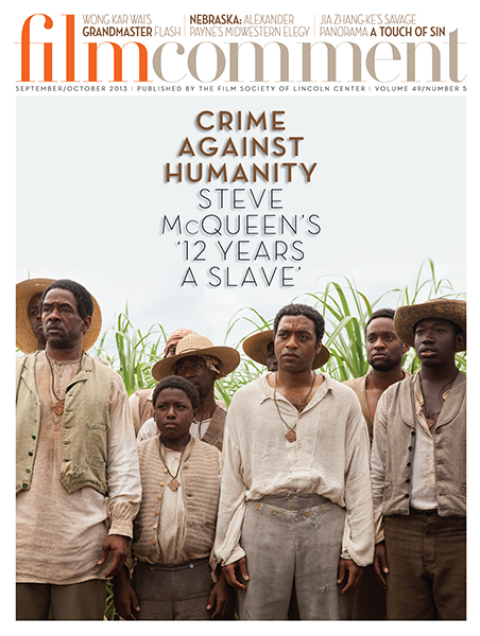Chinese whispers have it that Jia Zhang-ke, the foremost Chinese director of his generation, has an unexpected fan. At a diplomatic dinner some years ago Xi Jinping, the man who this year became China’s president, talked cinema with the American seated next to him. It’s widely rumored—indeed, reported in The Guardian—that Mr Xi’s small talk went something like this: “I’m not an admirer of the kind of films that Zhang Yimou makes. I much prefer Jia Zhang-ke’s films, like Still Life and I Wish I Knew.” Since the story undoubtedly contains a kernel or more of truth, it may help explain why the Film Bureau swallowed its pride and passed Jia’s Cannes prize-winner A Touch of Sin for release in China with only minor changes.

A Touch of Sin
A Touch of Sin is not much like the script that Jia sent to the Film Bureau for pre-production approval. Across four stories inspired by recent real-life events, the film is a “state of the nation” report that poses several interesting questions. Such as, why do so many “small” incidents in China today explode into rage, violence, and even murder? Such incidents mostly go unreported in the official media, which remains state-controlled and subject to censorship at many levels. But news of them nowadays spreads rapidly through Weibo, China’s answer to Twitter and now the most trusted news source for many urban Chinese. Jia Zhang-ke is an avid user of Weibo, and his own blog posts have legions of followers.
One of the stories recycled into the film did reach the wider world, thanks to Reuters and Agence France-Presse. This was 2012’s sudden spate of suicides by young assembly-line workers in the foreign-owned factories of the “free enterprise zone” near the Hong Kong border. The reports all focused on issues like working hours and conditions and low wages, but Jia is more interested in the various emotional and psychological traps that lie in wait for the pretty, vacant kids who flock to those jobs from China’s vast rural hinterlands. The other three stories will be less familiar. The first riffs on an incident in Jia’s native Shanxi Province: a villager outraged by profiteering and corruption in his local community took a hunting rifle and shot dead various officials and entrepreneurs. The second details the stunted emotional life and professional modus operandi of a loner-killer who finds life boring except when he’s shooting a gun. The third centers on a young woman in an unresolved relationship with a married man; she has a lousy temp job on the reception desk of a sex-sauna in Yichang, and one day stabs an abusive customer who demands that she “massage” him. And the fourth shows the short, frustrated life of a kid from Hubei who jumps off the balcony of a factory dormitory building in the south after suffering one setback too many.
A Touch of Sin tells its stories sequentially, embedding a chapter title in each, but uses little narrative overlaps to link them and finally resolves itself into a circular structure—closing, as it began, in Shanxi Province with the rapacious expansion of the Shengli Corporation. In the first story, this outfit has bought a coal mine formerly owned and run by the state but has reneged on its promises to share profits with the local community; this is what provokes the protagonist Hu Dahai’s murderous rage. In the film’s coda Zheng Xiaoyu, the woman from the sauna story, arrives in Shanxi and applies for a job in a Shengli company soft-drink bottling plant; since its founder Jiao Shengli was shot in the head in his Audi in the first story, the company is now headed by his widow. (As many non-Chinese-speaking viewers may intuit, “Shengli” means “Victory.”) The neat circularity is not just a narrative device; it consolidates Jia’s observation that expanding conglomerates, working hand-in-pocket with local government, have effectively replaced the Communist Party as controllers of individual destinies. (The film’s Chinese title, Tian Zhuding, translates as “Ill-Fated.”)

Pickpocket
Jia’s own relationship with the Communist Party has been through some changes. He started out as a committed independent in both word and deed. His first feature Xiao Wu (aka Pickpocket, 98) was made with friends from Hong Kong—one of whom, the cinematographer Yu Likwai, became a long-term collaborator. Following the example of China’s pioneering independents Wang Xiaoshuai and Zhang Yuan, he shot the film without permission and took it to festivals in the West behind the back of the authorities. At the same time he published a kind of manifesto for independent cinema, which soon became the most widely reprinted and influential essay on film culture in Chinese history. Two more independent features followed, both supported by “Beat” Takeshi’s Office Kitano in Tokyo: Platform (00) and Unknown Pleasures (02). Because they were made outside the system, these films could not be screened in cinemas in China. Instead, they achieved wide distribution as pirated DVDs; the proprietor of one long-gone pirate shop in Beijing told me a decade ago that he was shifting 50 copies of Xiao Wu every day. There’s even a joke about pirated copies of Jia’s films in Unknown Pleasures.
But Jia got tired of living in the margins. In 2004, he went through official channels to make his HD feature The World. Getting into bed with the Film Bureau meant accepting censorship, but Jia proved exceptionally skilled at circumventing it. Of course he never took the dissident route of directly challenging the Party’s right to rule; he’d be silenced or locked up if he did. Instead, he chose to show some of the ways individual lives can be blighted by the machinations of the state and left his audience—Chinese and foreign—to draw its own conclusions. That’s not to say that he doesn’t get away with the odd satirical jibe. Part of the fourth story in A Touch of Sin is set in an upscale Dongguan nightclub/ brothel called Golden Age in which the rooms are art-directed to fulfill the customers’ fantasies. The establishment’s pièce de resistance is a mock-up of the kind of railway carriage reserved for high-level Party cadres. The acerbic customer seen renting it (guest star Han Dong) is too cool to swallow the fantasy whole, but he does have a keen sense of what it’s like to think and behave as a “leader.” He could be channeling Taylor Mead as he upbraids the girl, dressed as a railway conductor, sent to service him: “You don’t know where we’re going? Young people today have no sense of direction…”
The most direct attack on Party morality comes right at the start of the film, in the “Wujinshan (Black Gold Mountain)” chapter. An introductory shot (of a truck delivering a huge, kitschy Madonna-and-child picture) establishes that this small town still has a prominent statue of Mao Zedong on main street, but no one expresses nostalgia for the days of hard-line ideological communism. Ex-miner Hu Dahai (Jiang Wu, the younger brother of actor-director Jiang Wen) wipes out Wujinshan’s ostentatiously wealthy elite and assorted cronies because the pragmatic ways of the “new” China have allowed them to get rich and arrogant by ignoring the terms of the contracts they signed when the former state industries were privatized. He does all the right things (challenges them face-to-face, tries to send a detailed complaint to central government in Beijing) before he snaps and takes justice into his own hands. Critics in Cannes likened his “honor killings” to something from a Sergio Leone film, but Jia shows explicitly that Hu is inspired by the outlaw heroes of the classical novel/opera The Water Margin; Hu even drapes a tiger-pattern cloth, evoking the legendary tiger-killer Wu Song, over his hunting rifle.

A Touch of Sin
Jia has made his own careful adjustments to the new China—and has done so much more elegantly than the likes of Zhang Yimou and Chen Kaige, who look increasingly desperate in their search for ways to function in a state-capitalist environment and a privatized film industry. Jia formed his independent production company X-Stream in 2004 to make The World, and has cannily kept it afloat by maintaining his old alliances (Office Kitano, latterly MK2 in Paris), by forging new ones (notably with Shanghai Film Corporation, descended from the old Shanghai Film Studio), and by accepting sponsored commissions—on condition that they allow him creative freedom and final cut. His output in the past decade has been spectacularly varied: three fiction features (one with a strong documentary element), three documentary features and a couple of excellent shorts. He has also produced features for other directors: Walking on the Wild Side (06) and Mr. Tree (11) by his former assistant Han Jie, and two by first-time woman directors, Song Fang’s Memories Look at Me (12) and Quan Ling’s Forgetting to Know You (13). And he’s masterminded a series of online shorts sponsored by Johnnie Walker whisky, since anthologized as the feature Yulu (11). Every independent filmmaker in the world has cash-flow problems, but Jia seems to have found viable ways to produce high-caliber work on his own terms in a country caught between dirigiste controls and substantially lawless capitalism.
Before he wins any Entrepreneur of the Year awards, though, Jia is in line for plenty more critical praise. The early films were rooted in a kind of stylized realism (his “teachers” were Robert Bresson and Hou Hsiao-hsien), but since The World, Jia’s film language has evolved into something wondrous and sublime. He’s not interested in any line between fiction and documentary, but spikes both with moments of surreal fantasy: the absurd state monument that takes off like a rocket in Still Life (06), or the sudden appearance of a tightrope walker at the end of that film. At the same time, his style has become more Ophülsian: cuts and camera movements are often precisely synchronized with music and dialogue to create a stream of small cinematic epiphanies.
This reminds us that Jia has always wanted to make a musical; he’s come closest in Platform, but many of the characters in other films are defined by their singing or refusing to sing. It also reminds us that Jia is the most cinéphile of all Chinese directors. From its English title onwards, A Touch of Sin is laced with homages to King Hu and other classical wuxia directors. I Wish I Knew (10), his epic portrait of émigrés from Shanghai, has an unashamed bias towards the film industry’s political casualties and contains heartfelt tributes to directors Fei Mu and Xie Jin. In its uncensored version, it also contains a transfixing account of the actress Shangguan Yunzhu’s death during the Cultural Revolution in the Sixties, told by her son.

Platform
Like many Chinese, Jia is fascinated by the political mistakes of the past, and by the Party’s chronic reluctance to admit them or apologize. He shares Hou Hsiao-hsien’s impulse to cut through partisan propaganda and look at China’s modern history afresh. But he is even more fascinated by the problems and contradictions of the present, and A Touch of Sin is his most dynamic attempt yet to pinpoint the country’s “sins”—especially the rise in murders and acts of violence. The courtesy and respect that once governed social relationships in China were among the many things destroyed in the Cultural Revolution, but the surge in violence is new. Jia doesn’t presume to explain it, but he finds its roots in the damaged psychological gestalt of too many of his compatriots.
The protagonist of the film’s second story (chapter-titled “Shapingba” after the village on the outskirts of Chongqing where most of it is set) is the most damaged of the lot. Zhou San (played by Wang Baoqiang) travels around the country, killing and stealing money, some of which he sends back to the village to support his wife and son. He’s in Shanxi in the film’s prologue, gunning down three muggers who unwisely try to ambush his motorcycle on a country road. He travels back to Shapingba for the New Year festival—he brushes past Sanming, the protagonist of Still Life, on the Yangtze ferry—and arrives in time for his senile mother’s 70th birthday celebration. (His elder brother’s scrupulous accounting for the money left over from the birthday party contrasts with the financial chicanery exposed in Wujinshan in the previous story.) The chapter centers on the gap between Zhou’s acknowledged failure as a husband and father and his professional efficiency as a killer. In bed, he urges his usually abandoned wife to take a lover or petition for divorce; he’s unapologetic that his own ambition is to cross the faraway border into Burma, where he can buy a bigger and better gun. The family history suggests that Zhou is no kind of psychopath, so what has turned him into a conscienceless killer? He has a one-word answer: boredom.
The central characters of the other stories all have their personal problems. Hu Dahai has diabetes, and has clearly never recovered from the loss of his classmate girlfriend. In the third story, “Nightcomer Sauna,” Zheng Xiaoyu (played by Jia’s wife, Zhao Tao) is the child of separated parents and is pressuring her own lover to leave his wife. And Xiaohui, the kid from Hubei in the final story, “Oasis of Prosperity,” played by impressive newcomer Luo Lanshan, misunderstands his friendships with both girls and boys while fending off his mother back home, who keeps nagging him to send money. In this scheme of things, Hu Dahai’s “honor killings” look more like a personal vendetta than a principled political stand, and the film never implies that political change would remedy the inflicting or suffering of personal abuse. Still, there are underlying questions. For example, what makes one meathead (played by Wang Hongwei, the star of Xiao Wu) think he can buy Xiaoyu’s services in the sauna, despite being told, politely, that she’s not one of the “masseuses”? Testosterone? Maybe, but we know that the wad of cash he’s carrying was gained by extorting tolls from truckers using the road to the site of a new Yichang airport. He perceived an injustice—wear and tear on the road through his village—and took illegal action to accrue some benefit to himself and his buddies. And what made him think of doing that?

A Touch of Sin
Ultimately, the film is “political” in exactly the same way as the King Hu wuxia films that partly inspired it. It plays to the millions of Weibo users who heard things through the grapevine, many of whom will recall the incidents that inspired these stories. Of course, Jia proffers no solutions. He cunningly knits the stories together with recurrent motifs (such as characters who need advice to get where they’re going—the metaphor is transparent) and wraps things up with a scene in which Xiaoyu joins the audience for a performance of the classical opera Yu Tang Chun—an adaptation of which just happens to have been King Hu’s debut feature for Shaw Brothers in 1964. The opera tells the story of a young woman unjustly arraigned in court for a crime she didn’t commit—an ironic inversion of the stories told in the film. What’s missing from this picture—on stage and screen—is the rule of law.






